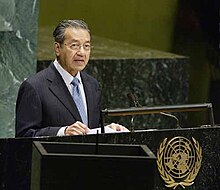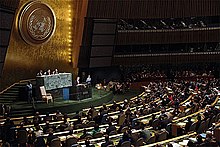United Nations General Assembly
| United Nations General Assembly United Nations General Assembly |
|
|---|---|
 Meeting room of the General Assembly |
|
| Organization type |
Principal organ of the United Nations |
| Abbreviation | UNGA |
| management |
President for the 76th session 2021-2022 Abdulla Shahid |
| status | active |
| Founded | 1945 |
| Headquarters |
New York City , New York , United States |
| Upper organization |
|
| UN General Assembly website | |
The United Nations General Assembly (abbreviated UN General Assembly ), more rarely UN General Assembly ( English United Nations General Assembly - UNGA ), the General Assembly of the Member States of the United Nations . It meets annually in September at the UN headquarters in New York City . Each Member State may be represented by up to five people at a meeting. The assembly met for the first time on January 10, 1946, in London's Westminster Central Hall , at that time with envoys from 51 states .
The General Assembly examines and approves the budget of the United Nations (Art. 17 I UN Charter ). Her further tasks include the deliberation and the adoption of recommendatory resolutions . The General Assembly may deal with practically any question of international importance as long as it is not dealt with at the same time by the UN Security Council (Art. 12 Paragraph 1 UN Charter).
In contrast to the resolutions of the UN Security Council, those of the UN General Assembly are not binding under international law , but can have political weight because they represent a decision by a majority of the member states. That does not mean, however, that its decisions have to have no effect under international law: The UNGA resolutions can, under certain conditions, contribute to the development of binding customary international law . In addition, the decisions of the UNGA, which concern internal organizational matters such as administrative or budget matters (budget), are binding for the Secretariat .
In order to facilitate the work, the General Assembly has set up committees ( committees ) on various topics, which in turn can convene working groups .

Main committees
The main committees of the General Assembly are in detail:
- The Committee on Disarmament and International Security (Main Committee 1)
- The Economic and Financial Committee (Main Committee 2)
- The Committee on Social, Humanitarian and Cultural Issues (Main Committee 3)
- The Committee on Specific Political Issues and Decolonization (Main Committee 4)
- The Administrative and Budget Committee (Main Committee 5)
- The Legal Committee (Main Committee 6)
poll
Each member state has one vote in the General Assembly (Article 18 of the UN Charter), which means that the vote of every state is equally valuable. Criteria such as size, population or economic strength are irrelevant. In the case of important questions, resolutions are passed with a majority of two thirds of the members present and voting. These include, for example:
- Recommendations regarding the maintenance of world peace and security
- the election of the non-permanent members of the Security Council and the other main bodies
- the admission of new members
- the suspension of a state's rights from membership
- the exclusion of members
- Budget issues
On other issues a resolution is passed with a simple majority.
When voting, approvals, votes against, abstentions and non-votes (mostly due to absenteeism) are recorded. Subsequent entries are sometimes also recorded.
Emergency meetings
According to Resolution 377A (V), which was adopted by the General Assembly on November 3, 1950, there is the possibility of calling emergency meetings within 24 hours if the UN Security Council is unable to take a decision or take action to take to maintain international peace and stability. The latter is usually the case when the Security Council is divided, i.e. blocked by a veto by one or more of its members. Such emergency meetings are called if at least seven representatives of the states represented on the UN Security Council or a majority of the UN member states so request. The plenary meeting called by emergency meeting can then decide on measures to resolve a crisis with a two-thirds majority of the members present. This also includes military measures.
There have been ten emergency meetings in the history of the United Nations:
| Emergency meeting | object | Session (s) |
|---|---|---|
| First | Suez crisis | November 1st to 10th, 1956 |
| Second | Hungarian popular uprising | November 4th to 10th, 1956 |
| third | Lebanon crisis 1958 | August 8-21, 1958 |
| Fourth | Congo crisis | September 17-19, 1960 |
| Fifth | Six Day War | June 17-18, 1967 |
| Sixth | Soviet intervention in Afghanistan | January 10-14, 1980 |
| Seventh | Israeli-Palestinian conflict | July 22-29, 1980 April 20-28, 1982 June 25-26, 1982 August 16-19, 1982 September 24, 1982 |
| Eighth | South African rule in Namibia | September 13-14, 1981 |
| Ninth | Israeli occupation and annexation of the Golan Heights | January 29 to February 5, 1982 |
| Tenth | Israeli-Palestinian Conflict , Israeli Occupied Territories , East Jerusalem | April 24 to 25, 1987, July 15, 1987, November 13, 1987 March 17, 1998 February 5 to 9, 1999 October 18 to 20, 2000 December 20, 2001 May 7, 2002, August 5, 2002 19. September 2003, October 20 to 21, 2003, December 8, 2003 July 16 to 20, 2004 November 17, 2006, December 15, 2006 January 15 to 16, 2009 December 21, 2017 |
Reform proposal
The UN General Assembly is not a parliament . It is an assembly of instructed, diplomatic officials of the governments of the UN member states without direct democratic legitimation through elections. The designation of the UN General Assembly as “world parliament” is therefore misleading.
In the course of reform efforts, it was proposed to add a parliamentary assembly at the United Nations to the nation system, which could consist of delegates . Such a body could be set up as a subsidiary body to the General Assembly in accordance with Article 22 of the UN Charter or as a main body in accordance with Article 108 of the same. The establishment of an international organization that would be linked to the United Nations through a cooperation agreement would also be conceivable .
See also
Web links
- Official website of the UN General Assembly ( UN languages : Arabic, Chinese, English, French, Russian and Spanish)
Individual evidence
- ↑ 75th Anniversary of the UN General Assembly , UNRIC January 11, 2021, accessed May 31, 2021
- ↑ More details on the rules of procedure for the General Assembly (PDF; 1.3 MB), Rule 98.
- ^ General Assembly Voting. In: research.un.org. June 19, 2019, accessed June 22, 2019 .
- ^ Uniting for Peace. United Nations, November 3, 1950, accessed January 7, 2018 .
- ↑ a b Emergency Special Sessions. UN General Assembly, accessed January 7, 2018 .
- ↑ More on this, Democratic Legitimation of the Activities of International Organizations (PDF; 899 kB), p. 20 ff.
- ↑ The implementation of a UN Parliamentary Assembly on UNPA Campaign, accessed on August 7, 2017

